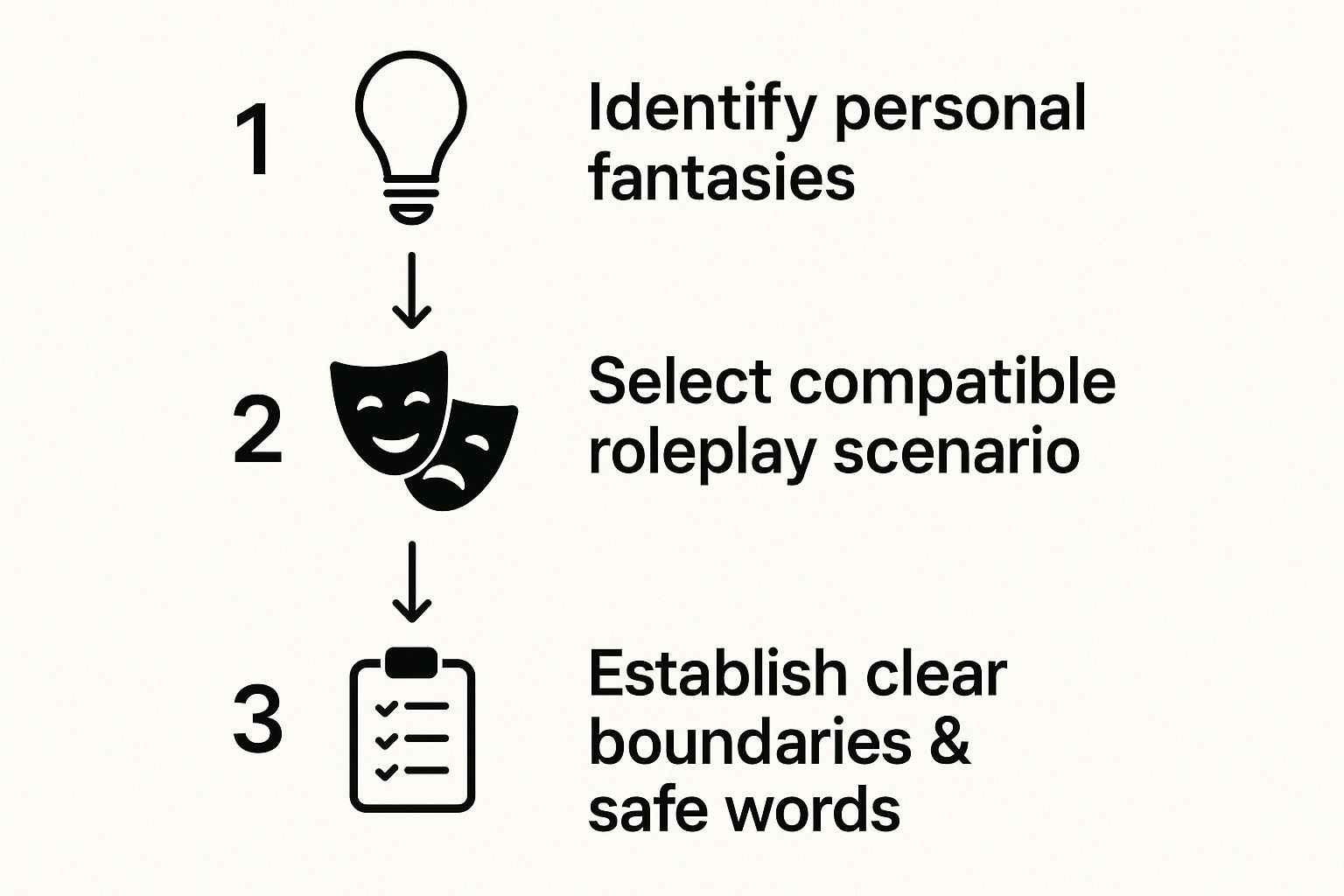Create Your Own AI Girlfriend 😈
Chat with AI Luvr's today or make your own! Receive images, audio messages, and much more! 🔥
4.5 stars

At its heart, sexual roleplay online is a form of collaborative, consensual storytelling for adults. It's a creative game where you and a partner build characters and a shared world to act out fantasies. This goes way beyond simple sexting; it's about crafting an interactive narrative and developing characters together in a digital space.
Exploring the World of Digital Roleplay

Jumping into sexual roleplay online is less about one specific act and more about diving into a whole spectrum of creative expression. It gives people a safe, controlled environment to explore parts of their identity, their deepest desires, and their imagination. For many, the real appeal is the freedom to become someone else for a while and co-create an intimate story with a partner.
This kind of interaction has been around for a long time, but the tools and platforms we use have come a long way. What began in old-school, text-based forums and IRC chat rooms has blossomed into sophisticated platforms with features designed specifically for roleplayers.
What Does It Actually Involve
So, what does this actually look like in practice? Far from being one-size-fits-all, online roleplay has countless forms, each with its own vibe and community rules. At its core, though, it’s always about building a shared world with someone, even if that world only lasts for a single scene.
This creative process usually breaks down into a few key parts:
- Character Creation: You'll dream up a persona, giving them a unique personality, a backstory, and a reason for being in the story.
- Scenario Building: Together, you'll decide on the setting, the basic plot, and the context for your characters' interaction.
- Collaborative Writing: This is the fun part—taking turns writing your character's actions, thoughts, and dialogue, reacting and building on what your partner writes.
- Consent and Communication: This is the non-negotiable foundation. You're constantly checking in to make sure everyone involved is comfortable, engaged, and excited about where the story is heading.
The entire focus is on mutual enjoyment and creative discovery. It's a powerful outlet that mixes the intimacy of a shared fantasy with the art of storytelling, creating a unique connection built entirely on imagination.
The real magic of online roleplay lies in its collaborative nature. It’s a dance of words and ideas where two people build something entirely new together, guided by mutual trust and creativity.
Common Venues and Styles
Where you choose to roleplay can drastically shape the experience. Some people love the long-form, highly detailed style you find on dedicated roleplaying forums. Here, a single scene can unfold over days or even weeks, with a heavy emphasis on descriptive, novel-like writing and deep character exploration.
On the other hand, many prefer the fast-paced, back-and-forth action of private messages or a dedicated server on a platform like Discord. The pacing is much quicker, feeling more like a live-action script than a novel.
Neither style is better than the other; they just cater to different tastes for speed, detail, and immersion. No matter where you play, the fundamentals of consensual, imaginative storytelling are always the same.
Setting Clear Boundaries and Consent
Let's get one thing straight: consent isn't just a formality or a box to tick. It is the absolute foundation of any healthy, exciting, and safe online sexual roleplay. Without a clear, enthusiastic, and continuous "yes" from everyone involved, what should be a fun, creative escape can quickly turn into something uncomfortable or even harmful.
Think of it less as a one-time permission slip and more as an ongoing conversation. It’s about creating a space where everyone feels completely comfortable voicing what they’re into and, just as crucially, what’s off the table. This dialogue needs to happen before you even type the first line of a scene and should remain open throughout your time together.
This diagram perfectly illustrates the ideal way to kick things off. You start by figuring out what you want, find a scenario that clicks, and then—before anything else—you lock in the safety rules.

As you can see, safety isn't an add-on; it's woven into the very fabric of setting up a good scene. This ensures your creativity and your comfort can exist side-by-side from the get-go.
Soft Limits vs. Hard Limits: Know The Difference
A huge part of that initial conversation is about defining your limits. Getting this right is everything. We usually split them into two simple categories: soft limits and hard limits.
- Hard Limits: These are your non-negotiables, your absolute "no-go" zones. A hard limit is a topic, theme, or action that you want no part of, ever. Crossing a hard limit is a serious breach of trust and should bring the scene to an immediate halt.
- Soft Limits: Think of these as your "proceed with caution" areas. They're themes you might be a little hesitant about but could be convinced to explore if the mood is right or if you really trust your partner. If a soft limit comes up, it’s a cue for extra communication and frequent check-ins.
For example, a hard limit might be anything involving non-consensual themes. A soft limit, on the other hand, could be light humiliation—something a person might be open to, but they'd want to handle it very carefully.
To make this crystal clear, here’s a quick checklist you can run through with a new partner. Discussing these points upfront can save a lot of trouble later.
Consent and Boundary Setting Checklist
| Checklist Item | Example Discussion Point | Why It's Important |
|---|---|---|
| Hard Limits | "Just so you know, my hard limits are scat, gore, and anything non-con. What are yours?" | Establishes non-negotiable boundaries to prevent serious discomfort or harm. |
| Soft Limits | "I'm a little hesitant about CNC, but I could be open to a very light, negotiated scene. How do you feel?" | Identifies sensitive areas that require extra care, communication, and trust. |
| Safewords | "I use the traffic light system: Green/Yellow/Red. Does that work for you?" | Provides a clear, out-of-character tool to manage comfort levels in real time. |
| Check-in Frequency | "If we get into intense territory, can we agree to a quick 'Green?' check every so often?" | Ensures consent is ongoing and allows for adjustments before a limit is reached. |
| Aftercare Plan | "After a heavy scene, I usually need to chat OOC for a bit to decompress. What about you?" | Acknowledges the emotional side of roleplay and provides a plan for support afterward. |
Running through these topics isn't about killing the mood—it's about building the trust needed to truly let go and enjoy yourselves.
Making Safewords Your Best Friend
Safewords are your in-the-moment lifeline. They are simple, out-of-character words that slice through the fantasy to let your partner know you need to pause or stop, no ambiguity allowed.
Safewords are your safety net. They allow you to dive deep into a fantasy, secure in the knowledge that you have a clear, unmistakable way to pull back at any moment, for any reason.
The traffic light system is probably the most popular and for good reason—it’s intuitive.
- Green: "All good, I'm loving this, keep going!" It’s a great way to check in and affirm that you’re on the same page.
- Yellow: "Okay, let's slow down a bit." This signals you're getting close to a limit or aren't entirely comfortable with where things are headed. It's a request to ease up or change direction.
- Red: "Stop. Now." This is a full-stop, no-questions-asked brake that ends the scene immediately.
Agreeing on safewords beforehand is absolutely essential. It’s the single most important tool for making sexual roleplay online a genuinely safe and trusting experience for everyone.
Finding Safe Platforms and Partners

Let's be honest: the internet is a wild place. Not every forum or chat app is built for safe, intimate storytelling, so finding the right spot for sexual roleplay is probably the most important decision you'll make. A good platform puts user safety first, gives you solid privacy controls, and actually enforces its own rules. Without that foundation, you’re just opening yourself up to a world of trouble.
Your best bet is to stick to communities built specifically for adult roleplay. It can be tempting to use mainstream social media, but those places are a minefield. They usually lack the right moderation tools and a culture of consent, making it way too easy for boundaries to get crossed. The statistics back this up, with studies showing that many minors have sexual interactions on major social apps. If you're an adult, you need an adult space. For a deeper dive into the risks, research from organizations like Bravehearts is incredibly eye-opening.
Choosing Your Roleplay Venue
When you're checking out a potential new home for your hobby, pay close attention to the community vibe and the moderation policies. Dedicated roleplaying websites, specific subreddits, and private Discord servers are the usual go-to's, and each has its own flavor.
- Dedicated Websites: These are often the most structured option. They come with built-in tools for character profiles, private messaging, and content filters, which helps create a more secure environment from the get-go.
- Reddit (Subreddits): Places like r/Roleplay have pretty strict rules and active moderators, but the responsibility is still on you to carefully vet every potential partner.
- Discord Servers: A private, invite-only server can feel like a cozy, tight-knit community. The catch? Its safety is 100% dependent on how seriously the owner and admins take moderation.
The best platforms aren't just about cool features; they're about culture. Look for communities that talk openly about consent, have crystal-clear rules against harassment, and make it easy to report problems without feeling judged. A healthy community is your best line of defense.
If you're curious about exploring roleplay with an AI, that's a whole other world opening up. These platforms offer a unique way to experiment with stories all by yourself. You can learn more about how it all works by checking out our guide on https://www.luvr.ai/features/ai-character-chat.
How to Vet Potential Partners
Finding a good platform is half the battle. The other half is finding a partner you can trust. That first conversation is everything—it’s your chance to see if you click and to spot any red flags before you get emotionally invested.
A great partner will be genuinely happy to talk about boundaries, limits, and safewords. They'll respect a "no" without pushing back and will give you the time and space you need to build trust. Be really cautious of anyone who tries to rush you into a scene, brushes off your safety concerns, or starts pushing your limits before you've even agreed on anything. This vetting process is your single best tool for making sure your roleplay experiences are fun, consensual, and, above all else, safe.
Crafting Scenarios and Characters That Sizzle
Great online sexual roleplay is all about telling a compelling story together. Once you’ve covered the crucial groundwork of consent and safety, the real fun begins—building a world and stepping into the shoes of characters who feel completely alive. The secret is to move beyond the same old setups and create something truly memorable.
The best scenarios have just enough detail to spark the imagination but plenty of room to improvise. Instead of a generic "let's meet at a bar," think about adding a twist. What if it's a smoky, underground jazz club in the 1940s? Maybe one of you is a detective on a case, and the other is a mysterious singer holding a dangerous secret.
That single layer of context adds instant motivation, tension, and a world of possibilities. It transforms a simple meet-up into the start of a real story.
Building Characters That Feel Real
A good character is so much more than just a name and a set of physical traits. To make them breathe, you have to know what drives them. What do they want more than anything? What are they secretly afraid of? Even a simple backstory can give you a ton of fuel for how they'll act and react.
When you're dreaming up a new persona, think about these key ingredients:
- A Core Desire: What's their main goal in this scene, and in life? It could be anything from seeking validation or power to finding a genuine connection.
- A Defining Flaw: Nobody's perfect. Giving your character a flaw—maybe they're arrogant, deeply insecure, or a bit reckless—makes them relatable and wonderfully unpredictable.
- A Unique Quirk: Does your character have a specific tic, a funny way of talking, or a weird hobby? These little details add so much personality and flavor.
Think about it: a powerful CEO who secretly craves being vulnerable is infinitely more interesting than just a "dominant boss." These layers give both of you something to uncover as the scene plays out.
The most compelling characters are often full of contradictions. A tough exterior might hide a soft heart, or a shy demeanor could conceal a wild side. Exploring these internal conflicts is what makes a roleplay truly dynamic.
Choosing Your Writing Style
The perspective you write from completely changes the feel of the scene. In the world of online roleplay, the two big players are first-person and third-person. Neither is better than the other; it’s all about what feels right for you and your partner.
- First-Person ("I"): This style is immediate, intense, and deeply personal. When you write as "I," you're putting your partner directly inside your character's head, which is fantastic for sharing raw emotions and internal thoughts. It creates a very intimate vibe.
- Third-Person ("He/She/They"): Writing this way feels a bit more like co-authoring a novel. It gives you more freedom to describe your character’s actions, expressions, and appearance from an outside point of view. For many people, this little bit of distance helps them separate from their character and be more descriptive.
The most important thing is to chat about it beforehand. A mismatch in styles can be jarring and pull you out of the moment, so agreeing on a consistent perspective keeps the story flowing smoothly.
Ultimately, your goal is to be a confident and creative partner in building a shared fantasy. If you're looking for a low-pressure way to practice or just need some fresh ideas, an AI platform can be an amazing sandbox. You can experiment with all kinds of characters and situations when you generate a new scenario to find out what you enjoy. It’s a great way to build your confidence before jumping in with a human partner.
Navigating Roleplay Etiquette and Communication

Every online community has its own unwritten rules, and the world of sexual roleplay is no different. Getting a handle on this etiquette isn't just about being polite; it’s about showing genuine respect for your partner's time, their creativity, and most importantly, their boundaries. The truth is, thoughtful and reliable partners are always in high demand. Building that kind of reputation starts right here, with good communication.
One of the biggest rules of thumb is to respect character autonomy. You're in the driver's seat for your character's actions, thoughts, and feelings—and your partner has that same control over theirs. Trying to dictate how their character reacts or what they do is a classic misstep known as "god-modding." It's a fast way to kill the collaborative vibe, so just don't do it.
Keeping In-Character and Out-of-Character Separate
Clear communication is absolutely essential, especially when you need to break character and talk person-to-person for a moment. This is where out-of-character (OOC) tags come into play. Simple markers like parentheses () or brackets [] are the universal signal that you're speaking as yourself, not as your character.
This little habit is a game-changer for a few key reasons:
- Clarifying Intent:
(Just to check, are we moving toward the bedroom scene now?) - Checking Comfort Levels:
[Hey, this is getting a bit intense for me, can we tone it down? Yellow.] - Planning Next Steps:
((I have to log off in about 30 minutes, is that enough time to wrap this scene up?))
When you don't use OOC tags, wires get crossed. It's easy for in-character actions to be misinterpreted as real-life feelings, and that's a recipe for confusion and hurt. This simple practice keeps the game fun and the real-world communication healthy.
Think of OOC chat as the director's commentary for your shared story. It’s the behind-the-scenes conversation that ensures the final production is something both "actors" are proud of and comfortable with.
Giving Feedback and Ending Scenes Gracefully
Look, not every scene or partner will be a perfect fit. And that's perfectly okay. What marks a mature, experienced roleplayer is the ability to give and receive feedback constructively. If something isn't working for you, bring it up kindly and directly in OOC chat. Frame it around your experience ("I'm feeling...") instead of placing blame ("You're doing...").
Just as important is knowing how to bow out gracefully. Whether a scene has run its natural course or a partnership just isn't clicking, a simple and respectful OOC message is all that’s needed. Ghosting—just disappearing without a word—is seen as deeply disrespectful and can quickly tarnish your reputation in the community.
The growing interest in these activities mirrors a broader shift in how people express themselves sexually online. A global analysis of web trends found major changes in searches for sexual paraphernalia, pointing to evolving interests in things like sexual roleplay online. It's a clear sign that digital spaces are now central hubs for people to find these communities. For a deeper dive into these patterns, you can explore the full findings on digital sexual behavior.
Protecting Your Privacy and Personal Safety
Online roleplay is all about exploring fantasy, but the digital risks you face are very real. Keeping yourself safe isn't just a good idea—it’s absolutely essential. The whole point is to build a solid wall between your real-life identity and your online persona, making sure your private life stays completely separate.
This starts with the absolute basics. Your username should never have your real name, birth year, or city in it. I always recommend setting up a brand-new email address just for your roleplay accounts. It’s a simple step that prevents any accidental crossover with your personal or work life.
Treat your personal information like it's a state secret. Don't share it. Period.
Keeping Your Digital Self Anonymous
Think of your online persona as a character you're playing. It's a role, and it should have zero connection to the real you. That means no pictures of your face, your home, or any local landmarks that could give away where you live.
It's surprising how small details can be pieced together. Mentioning your favorite coffee shop or complaining about your commute can be enough for someone with bad intentions to figure things out.
Here are a few practices I swear by to keep things separate:
- Use a VPN: A Virtual Private Network (VPN) hides your IP address. It’s a non-negotiable layer of security for this kind of activity.
- Scrub Your Photos: Before you share any image, even one you think is harmless, use a tool to strip the EXIF data. This hidden data can contain GPS coordinates and info about your phone.
- Keep It Separate: If you can, use a different browser profile or even a separate device for roleplaying. This stops cookies and browsing history from getting mixed up.
Your anonymity is your best defense. The second you let your real identity bleed into your roleplay, you open yourself up to risk. Maintain a strict firewall between the two worlds at all times.
Spotting Manipulation and Pressure
You have to go into this knowing that not everyone online has good intentions. The statistics on online exploitation are genuinely sobering. A global estimate showed that over 300 million children are victims of online sexual exploitation and abuse each year, which is a stark reminder of the dangers out there. You can read more about these global findings on online harm to children.
Predators can be subtle. They might try to disguise manipulation as part of a scene, pushing you to share personal info or cross boundaries you’ve already set.
Be on high alert for anyone who ignores your safewords, pushes your limits repeatedly, or tries to guilt you into something you’re not comfortable with. Trust your gut instinct. If a situation feels wrong, it is. End it. One of the best ways to protect yourself is by knowing exactly how a platform handles your data, which you can do by reading its https://www.luvr.ai/legal/privacy-policy.
Always, always prioritize your safety above the scene.
Got Questions? Let's Talk About Them.
Dipping your toes into the world of online sexual roleplay is exciting, for sure. But it's also totally normal for that excitement to come bundled with a bunch of questions. It's a new space, and you're not alone in wondering about a few things.
One of the biggest questions I see people grapple with is, "Are my fantasies weird?" The short answer? Probably not. The beauty of roleplay is finding niche communities where your specific interests are not only accepted but celebrated.
Then there's the anxiety about finding the right partner. How do you find someone who's into the same things you are? It takes a bit of looking, but platforms dedicated to roleplay are designed to help you connect with people who share your kinks and interests.
And of course, there's the big one: performance anxiety. Many newcomers worry they aren't a good enough writer.
Let's get one thing straight: this is collaborative storytelling, not a competition for a Pulitzer Prize. Your partner is there to build a scene with you, not to grade your prose.
Privacy is another huge topic, and it's something you should absolutely be thinking about. The best and simplest rule is to keep your real life and your roleplay life completely separate. That means using a different username, a dedicated email address, and never sharing personal details.
At the end of the day, it all boils down to a few key things. Open communication, enthusiastic consent, and a shared goal of having fun together are what make for a fantastic and safe experience.



